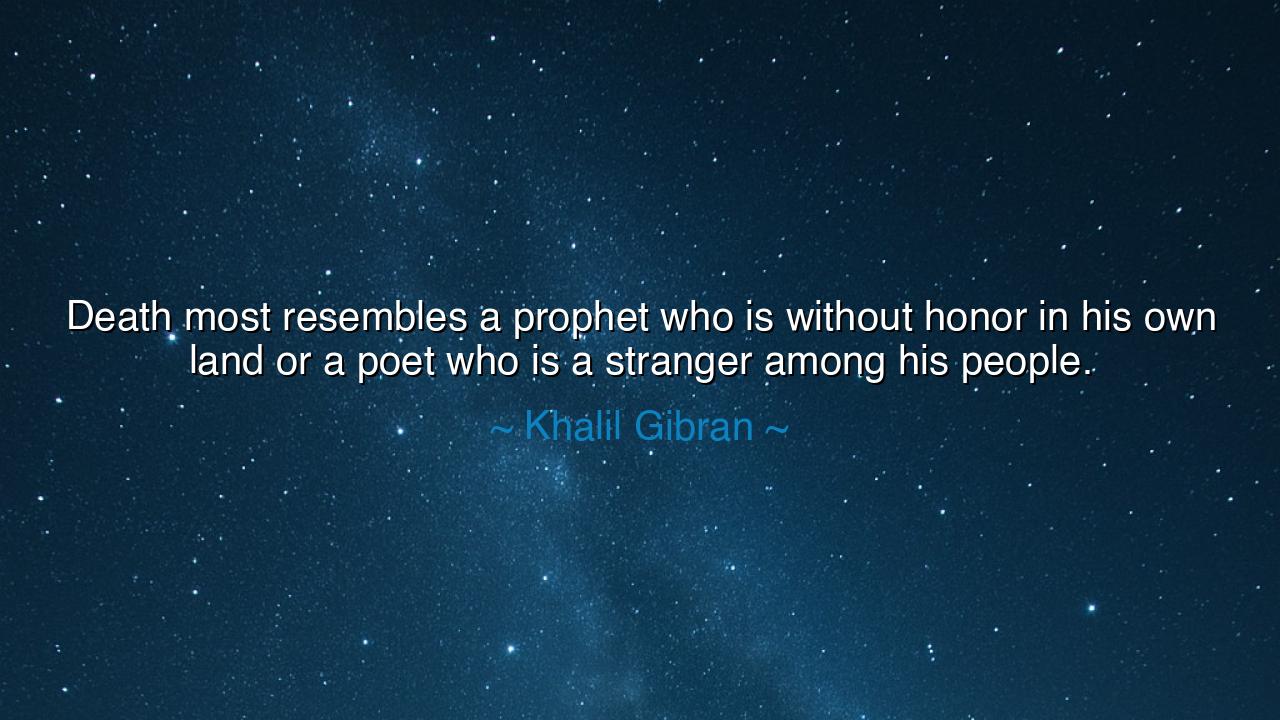
Death most resembles a prophet who is without honor in his own
Death most resembles a prophet who is without honor in his own land or a poet who is a stranger among his people.






When Khalil Gibran wrote, “Death most resembles a prophet who is without honor in his own land or a poet who is a stranger among his people,” he gave to the world not merely a reflection on mortality, but a revelation about the blindness of the human heart. In these few words lies the ancient truth that death, though inevitable and profound, is seldom understood or welcomed. Like the prophet, who speaks wisdom that others refuse to hear, death brings a message that humanity rejects until it is too late. And like the poet, who reveals beauty and meaning through pain, death walks among us unrecognized, its lessons dismissed by those still caught in the illusion of permanence.
The origin of this quote lies in Gibran’s own meditations on life and mortality, found within his work The Prophet and echoed throughout his writings. A mystic poet born in Lebanon and shaped by both the East and the West, Gibran saw death not as an end, but as a continuation—a sacred passage into the eternal. Yet he also saw how men feared it, how they turned away from its truth. In comparing death to a prophet without honor, he reminds us that humanity has always rejected what it cannot comprehend. Just as the ancient cities cast out their seers and mocked their vision, so do we exile death from our conversations, our culture, and our hearts. We hide it behind rituals and silence, forgetting that it is not our enemy, but our greatest teacher.
To call death “a poet who is a stranger among his people” is to uncover its paradoxical nature. The poet, too, speaks of things beyond the ordinary—he gives voice to beauty, sorrow, and mystery. Yet his people often ignore him, for his language is too deep, his meaning too uncomfortable. So it is with death: it speaks in the language of endings and beginnings, of humility and release. But we, fearing the unknown, close our ears. We treat death as exile when it is, in truth, homecoming. It is the foreigner whose accent frightens us, though he speaks our truest tongue.
History bears countless witnesses to this truth. Consider Socrates, the wise philosopher of Athens, condemned to death by his own city for daring to challenge its ignorance. In his final hours, he spoke calmly of death as a transition, not a curse. “To fear death,” he said, “is to think ourselves wise when we are not.” Like Gibran’s prophet without honor, Socrates’ message was rejected by those who could not see that death, rightly understood, brings clarity. They silenced him with poison, but his spirit endured, teaching future generations that what we call the end is merely the soul’s awakening. The people saw only loss; he saw truth.
Gibran’s vision calls us to awaken from our denial. Death is not to be worshipped, nor to be dreaded—it is to be understood. It strips away pretense, humbles the proud, and reveals the preciousness of life itself. The man who fears death fears living, for both are woven from the same divine thread. To live fully, one must look upon death not as a destroyer, but as a revealer. The prophet brings warning and wisdom; the poet brings beauty and meaning. Death is both—foretelling the end of one chapter and the beginning of another, while teaching us how to cherish every word written between.
If we would listen to death as we would to a prophet, we might live differently. We would waste less time on envy and anger, knowing that all such things dissolve in the end. We would speak more gently, love more deeply, and forgive more freely, for the boundaries of life are fragile and brief. To hear death’s poetry is to learn gratitude—to see that even sorrow and struggle are sacred, for they shape the soul. Those who fear death most are often those who have not yet learned to live; those who accept it find in its shadow a strange, luminous peace.
So, children of the mortal dawn, take this wisdom to heart: do not exile death from your thoughts, for it is the silent prophet who teaches life’s greatest truth. Do not scorn its voice, for its words are the poetry of return. Listen to what it whispers: that every breath is a miracle, every sunrise a gift, every heart that beats beside you a treasure. Let death remind you not to despair, but to awaken—to live each day as if it were your first and last. For one day, when the prophet’s voice calls, you will see clearly that he was never a stranger, but a friend who has been walking beside you all along.






AAdministratorAdministrator
Welcome, honored guests. Please leave a comment, we will respond soon